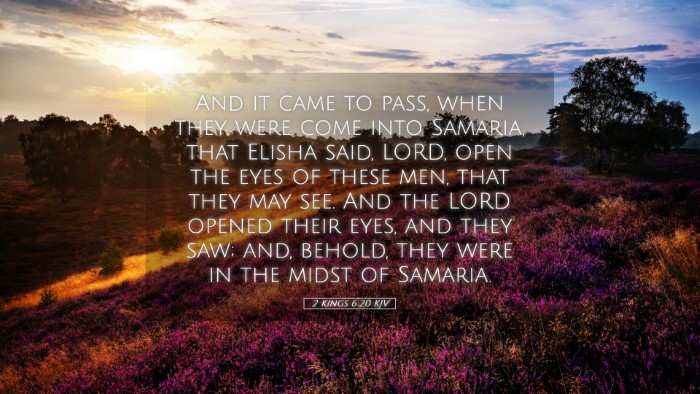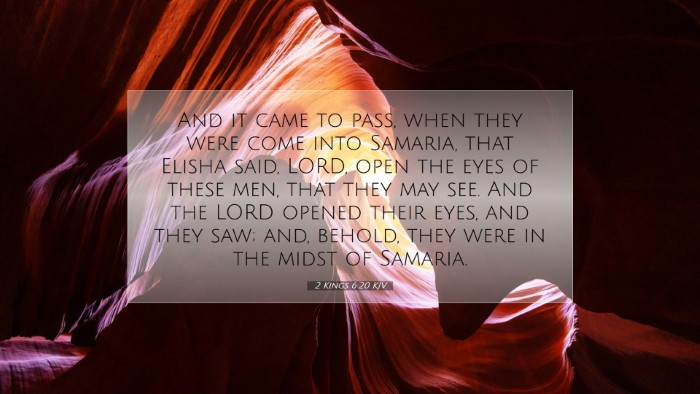2 Kings 6:20 - Biblical Context and Commentary
The verse reads: “And it came to pass, when they were come into Samaria, that Elisha said, Lord, open the eyes of these men, that they may see. And the Lord opened their eyes, and they saw; and, behold, they were in the midst of Samaria.” This verse encapsulates a significant moment in the ministry of the prophet Elisha, showcasing themes of divine revelation, mercy, and the sovereignty of God over nations.
Contextual Overview
To fully understand this verse, it is crucial to explore both its historical and theological contexts. The narrative occurs during a time of conflict between Israel and Aram (Syria), where Elisha serves as a prophet of God, guiding and protecting His people.
Historical Background
The events leading up to this moment involve the Aramean king sending troops to capture Elisha. However, Elisha, through divine insight, is consistently aware of the king’s plans, ultimately contributing to Israel's military successes. In a miraculous encounter, Elisha prays for the Aramean army to be struck with blindness, which they experience, allowing him to lead them into the heart of Israel.
Theological Significance
This verse emphasizes the power of God to reveal truth and the spiritual blindness of individuals in opposition to His will. By opening the eyes of the Arameans, God demonstrates His sovereignty over both Israel and its enemies. It highlights the contrast between human perception and divine revelation.
Commentary Insights
Matthew Henry’s Commentary
Matthew Henry highlights the miraculous nature of Elisha’s ministry, particularly the interplay of divine revelation and human intervention. He notes that the opening of the Arameans' eyes serves a dual purpose: to reveal their situation and to emphasize that they are within a territory protected by God. Henry points out that the act of seeing here signifies acknowledgment of God's sovereignty over even the mightiest armies.
Albert Barnes’ Commentary
Albert Barnes elaborates on the power of Elisha’s prayer and its immediate effect. He suggests that the term "opened their eyes" encompasses more than physical sight; it denotes a spiritual awakening to the reality of God’s presence. Barnes notes that this divine intervention is pivotal in allowing the Arameans to comprehend their vulnerability and the mercy extended towards them by Israel. He emphasizes that God's mercy often extends beyond His chosen people to their enemies, inviting reflection on God’s nature as merciful and just.
Adam Clarke’s Commentary
Adam Clarke offers a detailed analysis of the verse, focusing on the significance of Samaria as both a physical location and a symbol of Israel's identity and divine favor. Clarke interprets this moment as a turning point for the Arameans, suggesting that this encounter with divine power could lead to a transformation in their understanding of God. He posits that the opening of their eyes was not merely situational but a pathway towards repentance and faith. Clarke also discusses the implications of this story for contemporary believers, encouraging a reliance on God’s revelation in moments of uncertainty.
Practical Applications
This passage offers profound lessons for pastors, students, theologians, and scholars:
- The Role of Prayer: Elisha’s prayer for the Arameans reflects the importance of intercession, even for those who oppose us.
- Divine Sovereignty: Every situation conveys God’s ultimate authority, reminding believers to trust in His plans regardless of circumstances.
- Spiritual Blindness: This event serves as a metaphor for spiritual insight and the necessity of divine intervention in recognizing truth.
- Mercy and Grace: The passage encapsulates God’s merciful nature, encouraging believers to extend grace to others, even those who may be seen as adversaries.
- Transformation: The narrative invites reflection on how encounters with God can lead to life-altering changes, prompting believers to seek spiritual awakening.
Conclusion
In conclusion, 2 Kings 6:20 serves as a poignant reminder of God's redemptive purpose in the lives of both His people and their adversaries. The opening of eyes is a powerful metaphor for understanding spiritual truth and grace. Believers are encouraged to recognize the transformative power of God at work, as exemplified through Elisha's ministry and the subsequent awakening of the Arameans.


